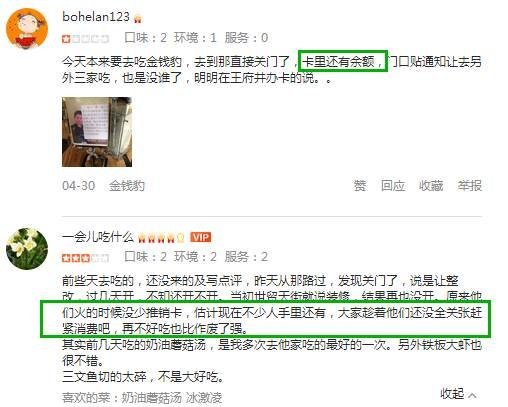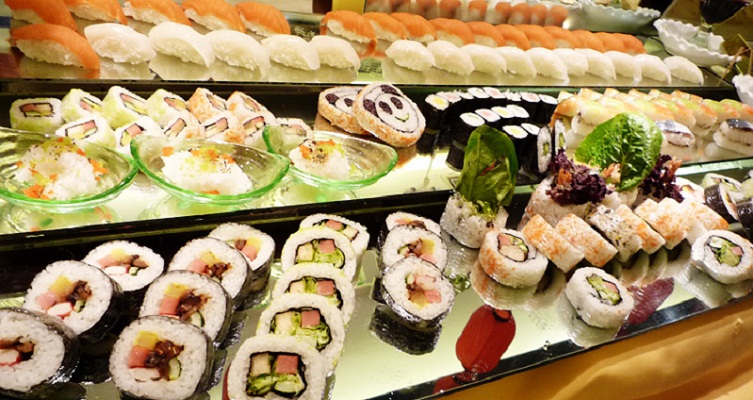Once a Food Hoarder’s Heaven, Infamous Golden Jaguar Buffet Closes All Beijing Locations
Along with the rapid closure of Beijing's favorite markets, the city has lost another of its longtime institutions: the last Golden Jaguar buffet, at Cuiwei Lu, closed on July 1. Famed for the abundant variety of food at its buffets, Golden Jaguar was unable to hang on following the shutting of its other branches across town, including at The Place, Wangfujing, Zhongguancun, and Yayuncun, according to Beijing News.
“Over a dozen suppliers went to the [Golden Jaguar] Cuiwei location to ask for a payment of debt, which reached an outrageous RMB 20 million. Only one of the 29 Golden Jaguar outlets around China remained as of June 28,“ Beijing News reports. “This wasn’t a one-off; over 10 suppliers also gathered outside the Yayuncun outlet to demand payment in May 2016, at which point the company's debt stood at over RMB 16 million. Golden Jaguar claimed that they were undergoing internal auditing, and were unable to pay suppliers due to a temporary freeze of their finances.”
It wasn't just the suppliers who were demanding their money back. Angry customers who had placed credit on the restaurant's membership card were also attempting to retrieve their cash. The company has said that people who registered with the restaurant will now be able to recoup that cash at the Cuiwei location, and it will take no longer than 45 working days for the money to return to their accounts.

Golden Jaguar, which opened its first branch in Taiwan in 1991 before coming to Shanghai in 2003 and up north shortly after, gained notoriety for its massive buffet-style feasts and self-defined “international cuisine collection.” The all-you-can-eat melding of Western and Chinese cuisines (think steak, sushi, oysters, abalone, and even crocodile) for around RMB 200 gave the restaurant a luxurious edge without breaking the bank.
READ: Beijing's Unrepentant Queen of Freeloading Gets Serious Jail Time After 14th Dine-and-Dash
By the end of 2014, there were 29 locations across 19 cities in China. However, between 2010 and 2014 the company was only achieving a turnover of HKD 957 million (approximately RMB 833 million), at a HKD 230 million loss after tax (approximately RMB 200 million). Coupled with rising costs, the chain was unable to bring in enough funds to stay afloat. Now only one branch remains in all of China, in Shanghai.

The restaurant was also affected by healthy diet trends. Recognizing the downside of gluttony, much of the public no longer wanted to eagerly stuff their faces with as much food as humanly possible anymore.

The final nail in the coffin was the increasing number of bad reviews circulating across Chinese review sites. Many reviewers complained about the “decreasing quality of food” and “lack of service” as well as the fact that Golden Jaguar “no longer provides Haagen Dazs.” To deal with decreasing appetites and to battle food wastage, some of the buffets across Beijing also began to ask for an extra RMB 100 as a deposit, a cheap move and unnecessary restriction in the eyes of many a seasoned all-you-can-eater.
With tastes edifying and becoming more refined, diners nowadays prefer restaurants that offer special dishes at good value, instead of the large and have-it-all restaurants with lesser quality food. All of these factors mean that there's much less room in China's lavish dining market for the free-for-all food frenzies of the past.
More stories by this author here.
Email: tracywang@thebeijinger.com
Twitter: @flyingfigure
Instagram: @flyingfigure
Photos: Beijing News, xltklj
Comments
New comments are displayed first.Comments
![]() charlesliu
Submitted by Guest on Sat, 07/08/2017 - 03:11 Permalink
charlesliu
Submitted by Guest on Sat, 07/08/2017 - 03:11 Permalink
Re: Once a Food Hoarder’s Heaven, Infamous Golden Jaguar...
China definitely does not have the world's highest prevalence of obesity.
...
But that's totally misleading data,
As the saying goes, China is a land of contrasts. It is a country with the unique problem of trying to solve malnutrition and obesity at the same time (or at one time). But to say that all the skinny people balance out the fat people doesn't give a clear outline of what we're talking about.
I'll totally agree that just because Beijing has more millionaires than NYC doesn't mean I'm rich. And just as there's a poverty gap, so is there a gap between over-nutrition and undernutrition, but the difference is that the latter is skyrocketing in China, climbing so fast it will reach USA #1 levels sooner than later. Are we going to wait until then to finally call China "fat" when we're deep inside the epidemic now? Do we need to wait until we hit 35% of 1.3 billion before the Fat-wa is issued?
Doc, let's all get harmonious and agree: the warning signs are here, prediabetes is a thing, and so is the dangerous spectre of childhood obesity. And to bring it all back to the subject at hand, it's clear that bad eating habits are leading to unhealthy lifestyles for many urban residents... like indulging in all-you-can buffets... ones that haven't gone under, anyways.
With USA-styled serving portions slowly gaining acceptance in China, things aren't getting better as people remain commited to thinking that being overweight is just a problem for unmarried women under 27.
![]() rstcyrmd
Submitted by Guest on Sat, 07/08/2017 - 01:37 Permalink
rstcyrmd
Submitted by Guest on Sat, 07/08/2017 - 01:37 Permalink
Re: Once a Food Hoarder’s Heaven, Infamous Golden Jaguar...
Sorry, I need to clarify the data here. China definitely does not have the world's highest prevalence of obesity. Just look at the real data on sites like www.worldobesity.org. The USA has 35% obese men, China has 12%. For women, 40% in the USA, 11% in China. Same issues with overweight stats. The confusion is that while the prevalence is smaller in China, it has so many more people that in total, China does have the most obese. But that's totally misleading data, it's much more relevant to talk about prevalence. And of course anyone walking down the street knows that obesity in China is nothing compared to the USA, the UK, Mexico, Saudi Arabia... But definitely it's becoming more of a problem in China, especially diabetes and prediabetes rates, that's the scary stuff in China, the tens of millions in China who don't even know they have prediabetes...
![]() charlesliu
Submitted by Guest on Fri, 07/07/2017 - 17:25 Permalink
charlesliu
Submitted by Guest on Fri, 07/07/2017 - 17:25 Permalink
Re: Once a Food Hoarder’s Heaven, Infamous Golden Jaguar...
Please cite an international credible source for your obesity claim.
Beijing is fat; fattest in China:
Beijing is China's Most Obese City, But Lacks Conviction to Confront It
One in Five Beijingers is Obese: City Government
Fat's Beijing: City Fights Back Against Childhood Obesity
China is 2nd fattest in the world (last year):
China has the largest fat population in the world (this year):
Beijing men have big bellies that they like to show off:
"Beijing Bikini" Successfully Satirizes Chinese Custom of Exposing Beer Bellies
![]() charlesliu
Submitted by Guest on Thu, 07/06/2017 - 16:32 Permalink
charlesliu
Submitted by Guest on Thu, 07/06/2017 - 16:32 Permalink
Re: Once a Food Hoarder’s Heaven, Infamous Golden Jaguar...
I’d prefer to believe that Chinese customers think value is the most important part, I’m not trying to ignore the fact that Chinese customers do “misbehave abroad“ to make the best of the buffet; they do pay dirt-cheap for travel tours, because the tours are with good value. In this case, Golden Jaguar’s decreasing quality, and poor-than-ever service makes it less value than before, for RMB 200-300 per person, they can enjoy a fine meal with better value, and the customers vote with their feet – visiting Golden Jaguar less and less.
[/quote]
If this is all true, then there should be a competitor racing to fill the void left by Golden Jaguar; with Chinese consumers willing to pay stupid amounts of money for it, there should have been a competitor waiting to pounce on a golden opportunity like this. And yet, I'm guessing there's not.
"Deluxe all-you-can-eat buffet" was just a fantasy, and now that fantasy is over once you tally up the bill.
![]() yidiandian
Submitted by Guest on Thu, 07/06/2017 - 14:57 Permalink
yidiandian
Submitted by Guest on Thu, 07/06/2017 - 14:57 Permalink
Re: Once a Food Hoarder’s Heaven, Infamous Golden Jaguar...
Recognizing the downside of gluttony, much of the public no longer wanted to eagerly stuff their faces with as much food as humanly possible anymore.
With tastes edifying and becoming more refined
I don't believe either of these points to be true. Although it sounds as though the current management of Golden Jaguar just ran it into the ground (or its previous source of financing dried up), Chinese consumers haven't changed: they want to pay the least possible amount of money for the maximum amount of value.
This shallow way of thinking has devastating consequences, and it's evident everywhere. Even though food safety is a top priority for Chinese consumers, they expect street food to cost at a price point next to free--despite gutter oil remains a real and constant threat. Chinese consumers are also only willing to pay dirt-cheap prices for travel tours, and then are flummoxed when tour guides try to force them to splurge at certain tourist zones in order to recoup their losses.
Remember those crazy buffet videos of Chinese tourists poorly misbehaving abroad? It all makes sense once you figure out that these buffets are run by Chinese management.
Chinese have become the second-fattest people in the world, and Beijingers lead the country in being obese; diabetes aside, it's what people want. Many remember what famine is like, explaining why the phrase "Have you had dinner yet?" is a common greeting here.
It's clear that Chinese consumers have no conscience when it comes to food waste, and were perfectly willing to exploit an all-you-can-eat buffet that tried to exploit them back. The shuttering of Golden Jaguar is a sign that China's affluent middle-class can't have its cake and eat it too.
I’d prefer to believe that Chinese customers think value is the most important part, I’m not trying to ignore the fact that Chinese customers do “misbehave abroad“ to make the best of the buffet; they do pay dirt-cheap for travel tours, because the tours are with good value. In this case, Golden Jaguar’s decreasing quality, and poor-than-ever service makes it less value than before, for RMB 200-300 per person, they can enjoy a fine meal with better value, and the customers vote with their feet – visiting Golden Jaguar less and less.
![]() charlesliu
Submitted by Guest on Thu, 07/06/2017 - 01:06 Permalink
charlesliu
Submitted by Guest on Thu, 07/06/2017 - 01:06 Permalink
Re: Once a Food Hoarder’s Heaven, Infamous Golden Jaguar...
Recognizing the downside of gluttony, much of the public no longer wanted to eagerly stuff their faces with as much food as humanly possible anymore.
With tastes edifying and becoming more refined
I don't believe either of these points to be true. Although it sounds as though the current management of Golden Jaguar just ran it into the ground (or its previous source of financing dried up), Chinese consumers haven't changed: they want to pay the least possible amount of money for the maximum amount of value.
This shallow way of thinking has devastating consequences, and it's evident everywhere. Even though food safety is a top priority for Chinese consumers, they expect street food to cost at a price point next to free--despite gutter oil remains a real and constant threat. Chinese consumers are also only willing to pay dirt-cheap prices for travel tours, and then are flummoxed when tour guides try to force them to splurge at certain tourist zones in order to recoup their losses.
Remember those crazy buffet videos of Chinese tourists poorly misbehaving abroad? It all makes sense once you figure out that these buffets are run by Chinese management.
Chinese have become the second-fattest people in the world, and Beijingers lead the country in being obese; diabetes aside, it's what people want. Many remember what famine is like, explaining why the phrase "Have you had dinner yet?" is a common greeting here.
It's clear that Chinese consumers have no conscience when it comes to food waste, and were perfectly willing to exploit an all-you-can-eat buffet that tried to exploit them back. The shuttering of Golden Jaguar is a sign that China's affluent middle-class can't have its cake and eat it too.
Validate your mobile phone number to post comments.

